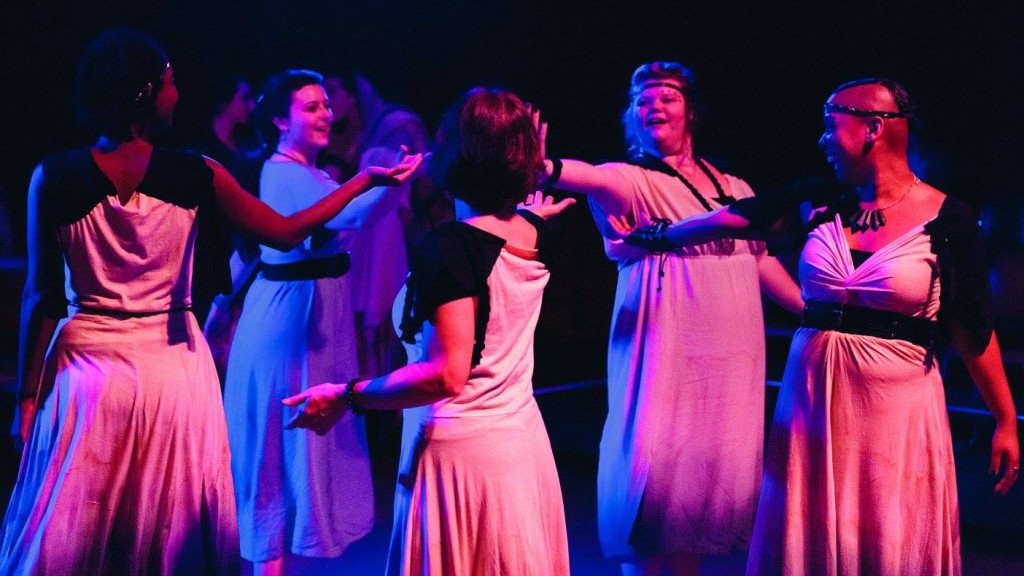
Photo by Tim Gurczak
Presented by Hub Theatre Company of Boston
Written by Timberlake Wertenbaker
Directed by Rebecca Bradshaw
Choreography by Tyler Catanella
Music direction and sound design by Bahar Royaee
Fight choreography by Rebecca Miller
Nov. 6 – 21, 2015
First Church Boston
66 Marlborough St
Boston, MA 02116
Hub Theatre on Facebook
Disclaimer: Mrs. Drexel did audition for this production and was not cast. She firmly believes that only a selfish ass would allow such a thing to taint her review.
Trigger warning: Gore, rape, feminist thought
Review by Kitty Drexel
“How do women still go out with guys, when you consider the fact that there is no greater threat to women than men? We’re the number one threat! To women! Globally and historically, we’re the number one cause of injury and mayhem to women. We’re the worst thing that ever happens to them!” – Louis C.K.
“Men are afraid that women will laugh at them. Women are afraid that men will kill them.” attributed to Margaret Atwood
(Boston, MA) The Love of the Nightingale is a Greek myth/morality tale that tells of the dangers of forcing women to be responsible for the sexualities of men. This self-aware play reduces gods and goddesses to the fears and urges of Man: if a dude behaves reprehensibly, it obviously must be the will of the gods. In the reality created by Wertenbaker, self-control and restraint are not wished by higher powers. Rape, victim blaming, unnecessary violence, and other terrible behaviors are. Gross.
The cast’s ensemble work is top-notch. Choreography by Tyler Catanella is a call and response metaphor for the war waged between men and women, the Greeks and the lands they dominated. The actors were compelled to use as much of the space in the auditorium as possible, nearly touching audience members and lashing out with their drama. Their movements echoed the traditional Greek chorus dances captured on ancient urns. Rachel Belleman was an authoritative, expressive dance captain.
The creepy yet beautiful incidental music/score played by chamber musicians Bahar Royaee, Mitra Ahi, and Eden Rayz permeated the room with tragic foreboding. At no time, when the musicians were playing, were we able to fully relax. A pluck of the cello here and a rumble of percussion there, the audience was kept on edge by the sinister implications of their playing. Had they been silent, perhaps the audience could have retained hope for the sisters. With their playing, we could not.
The musicians and the cast maintained a good balance and great focus. During dance-oriented scenes, there was a healthy give and take of energy between them.
While the physical elements of Nightingale were impressive, the emotional and mental aspects were sometimes lacking. Dramatic scenes were very dramatic. Lighthearted scenes lacked depth. For example, it was difficult to believe that Philomele (Lauren Elias) and Procne (Bridgette Hayes) were close sisters and best friends. They read as fond acquaintances at most. We can’t believe the most climactic of scenes if we don’t trust the introduction to their familial bond. This particular issue mainly affected the women in the cast. The men, the soldiers could get away with superficial relationships as the tenuous relationship with their King set for them a low bar.
And yet, this dearth of emotion worked scarily well for Jeff Marcus. I hated Tereus from the moment I saw him. He took all the breath out of the room with his redneck aesthetic, sensitivity of a barnacle, and dangerous vibe. This is clearly a man who’s never been told “no” in his adult life. Perfect for the role.
In such a live space, lines that may have been clearly enunciated by the cast sounded mumbled to the audience. Bathroom acoustics and a ¾ stage meant that consonants were softened and words were lost. Not all of the actors exhibited these symptoms. The audience didn’t struggle to hear but did struggle to understand (like you do).
In the beginning of the show, Procne warns Philomele that speaking of happiness tempts the gods to do ill. Really what she means is that women who dare to be independent thinkers will be squashed under the thumb of Patriarchy for their audacity to challenge gender roles. What she doesn’t say is that rape was a matter of course for entitled men with no boundaries. Everyone knows that if it was a legitimate rape, the gods have ways of shutting it down. Socratic method be damned.
Resources for domestic violence and sexual assault: Jane Doe Inc, BARCC; DOVE Inc, South End Community Health Center, RESPOND Inc
